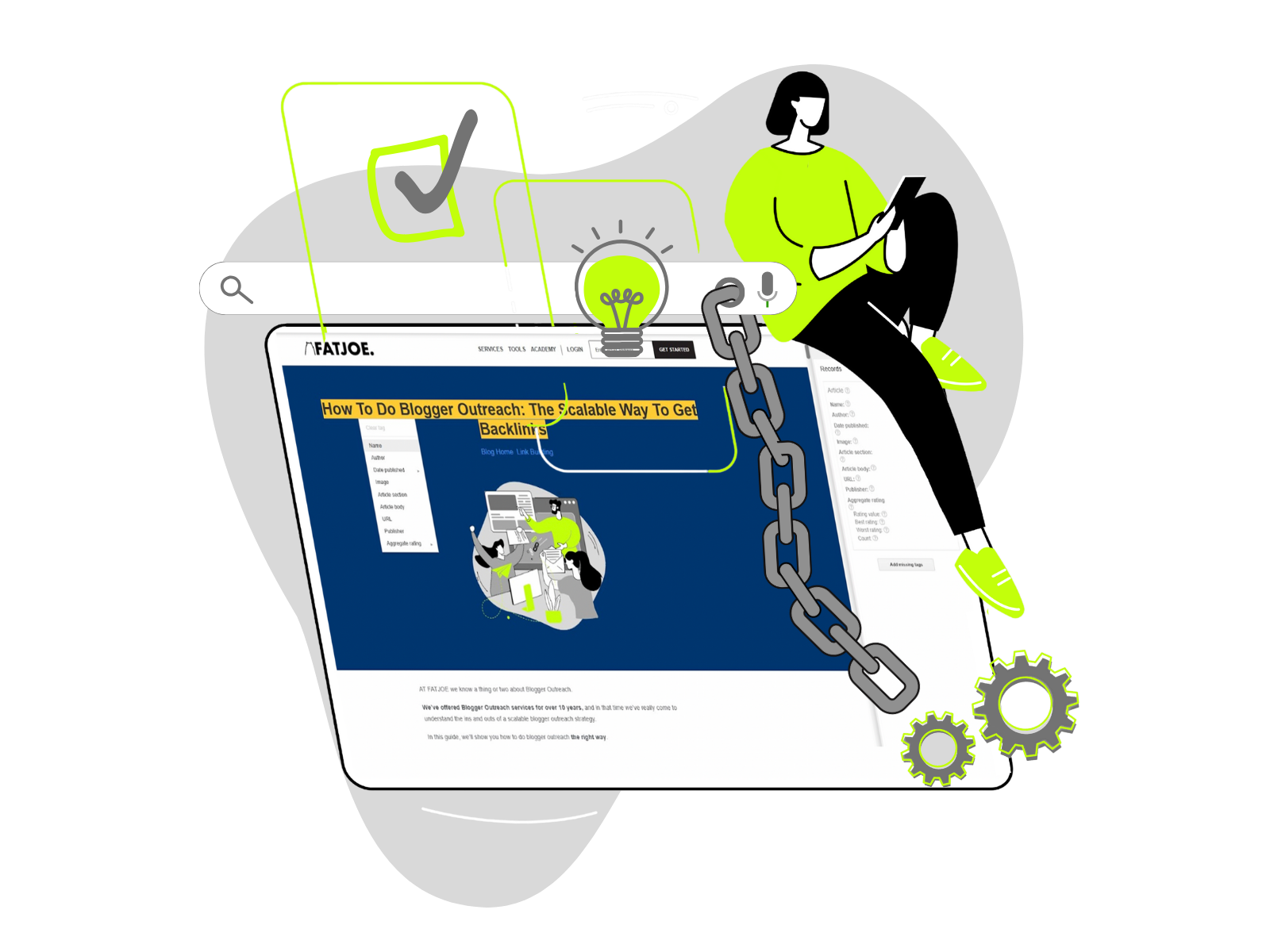
Have you noticed how Google is (mostly) getting better at understanding what you’re searching for?
Even if you mess up the spelling or can’t remember the name of the actor from that old sitcom, Google delivers the goods.
That’s because of ‘entities’.
Entities help search engines understand content beyond just keywords.
In this article, we’ll explore what entities in SEO are and how you can use them to boost your ranking.
We’ll cover:
- What entities are
- How Google uses entities
- Why entities are important for SEO
- How to optimize for entity SEO
- What is an Entity in SEO
- How entities matter for SEO agencies
What Is An Entity in SEO?
An entity in SEO is a record on a search engine database that represents something. An entity can be a person, place, product, event, idea, or brand.
Google defines an entity as “a thing or concept that is singular, unique, well-defined and distinguishable.”
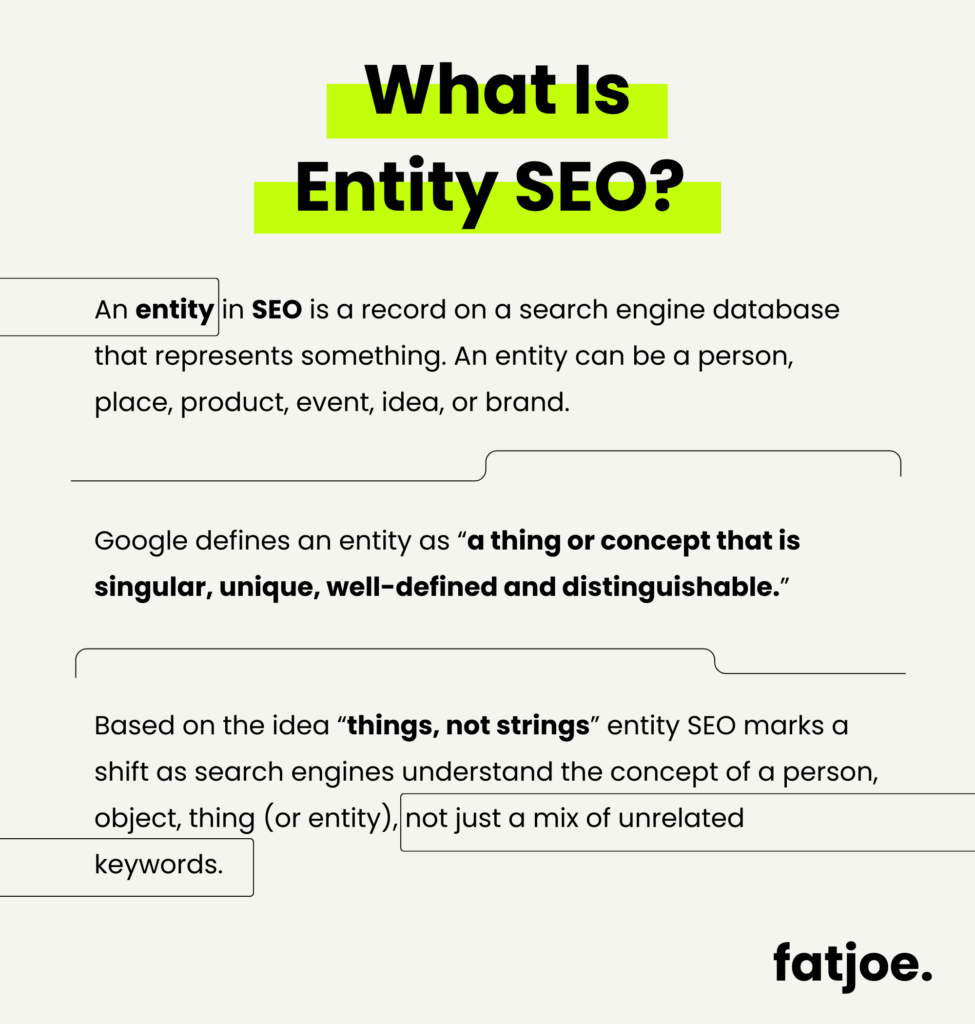
That’s still a little vague, so let’s look at an example.
If you search for the actor Sam Elliott, you’ll see a knowledge panel at the top of the search engine results page (SERP):
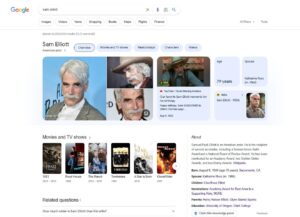
Instead of just 10 blue links, Google shows a summary of information about the actor, including his films, TV shows, family, etc.
All of this information is related to the Sam Elliott entity on Google’s Knowledge Graph.
Search engine algorithms don’t just look for matching keywords. They can now grasp concepts.
“Things, not strings.”
If you haven’t heard that phrase before, it’s from a Google blog post introducing the Knowledge Graph. It’s worth checking out the article for a bit more background.
SEO is now less about matching words on documents and more about creating pages that are about something #entities #knowledgegraph
— Bill Slawski ⚓ 🇺🇦 (@bill_slawski) September 18, 2016
Entities vs. Keywords
Keywords have been central to search engine optimization (SEO) for a long time. So, what’s the difference between a keyword and an entity?
A keyword is a term that people type into Google to search for a ‘thing.’
An entity is the digital representation of the ‘thing’ people search for.
Keywords = what people search
Topics = like the topics or broad areas we talk about irl
Entities = representation of objects/concepts. Digitalized replicas of smtg w/ some characteristics (attributes)— Marco Giordano (@GiordMarco96) April 18, 2022
Entities help search engines think more like humans. They can look at the context and connections between things rather than just specific words.
That doesn’t mean keyword research is dead.
You still need to know the terms people are searching for to get your content found in search results.
How Does Google Use Entities?
Google isn’t just looking for content that matches the words used in a search query. It’s trying to understand ideas and things to help users find the most relevant search results.
Google Knowledge Graph
The Google Knowledge Graph is an extensive database with information about people, places, ideas, etc.
These entities aren’t aren’t isolated. Google documents the connections between different entities.
For example, if you search for “movies with Sam Elliott,” Google knows how one entity (the actor Sam Elliott) is connected to other entities (the movies he has been in).
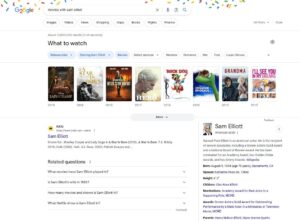
Google uses the Knowledge Graph to understand search queries and provide accurate search engine results.
Understanding Different Meanings
Entities help search engines look at the bigger idea or topic behind a word, not just the keyword itself.
For example, the word ‘bank’ has multiple meanings depending on the context.
Entity SEO is a smarter way of helping dumb search engines understand through context, to ‘know’ which I’m referring to when I say ‘bank’
Bank (financial)
Bank (river)
Bank (shot)
Bank (snow)
Bank (aircraft)
Bank (equipment)Context: ‘weather’ ‘plow’ ‘sled’
☃️❄️🎿@InLinks
— Grant Simmons (@simmonet) February 8, 2023
Google uses entities and natural language processing (NLP) to figure out which one you’re talking about. It looks at other words and entities in the search query to determine the user intent.
You can see how this looks in action by testing out Google’s NLP API tool.
The search engine can interpret and understand search intent by identifying related entities.
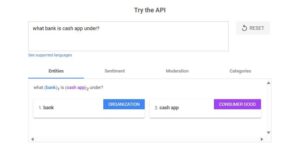
Search Suggestions
When you start typing in Google, the search engine suggests ways to finish your search. These suggestions often come from its understanding of entities.
Google provides a list of possible entities you could be searching for:
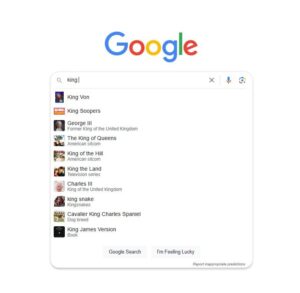
The autocomplete feature isn’t just predicting text – it’s predicting intent.
Google uses its knowledge of entities and the relationships between them to provide search suggestions.
Why Entities Matter in SEO
Entities help search engines see the whole picture, not just keywords. They are integral to the shift from keyword-based to context-based search.
For SEOs, optimizing for entities can improve search visibility and user experience. You can create entity-based content that is more valuable to your audience.
When Google views your website as an authoritative entity related to important entities (topics) in your niche, you can increase your ranking for your target keywords.
These ‘ranked entity’ results are a major testament to the importance of focusing on entities for SEO
It’s going to be hard to compete if Google doesn’t select your brand as a winner. When you click one of these brand names, the entire SERP becomes about that entity pic.twitter.com/xw5lnLuxCf
— Lily Ray 😏 (@lilyraynyc) March 15, 2022
How to Optimize for Entity SEO
Entity-based SEO is about making sure that Google recognizes your business or website as a distinct entity and links it with other relevant entities.
Here’s how you can do it:
Identify Relevant Entities
First, you need to know the main entities relevant to your website or business.
An entity audit is about identifying the entities you are known for and those you want to be known for.
Is your website about:
- Things you can buy?
- Different places?
- Certain people?
For example, a hiking website could be about gear (products), trails (places), and influencers (people). These are all relevant entities.
Entity-Based Content Silos
Organizing your content strategy around distinct entities can help users and search engines understand what your website is about.
For example, a health website could create entity-based content silos on:
Nutrition
Articles about healthy eating, vitamins, and more.
Exercise
Information about workouts, the benefits of exercise, tips for beginners, etc.
Weight Loss
Weight loss tips, dieting, weight loss programs, and success stories.
Each primary entity will have subcategories you can explore in your content.
This approach can boost your topical authority and help search engines understand and rank your content.
Optimize for Semantic SEO
Semantic SEO is all about understanding what users really want when they search online. Instead of focusing on exact keywords, zero in on the reason behind a search query.
What’s the search intent behind the query?
For example, if someone searches for “how to fix a leaky faucet,” they don’t want a bunch of information about faucets. They want a solution to their problem.
Think about the bigger questions people might have about your main topics and how you can address them in your content.
Use Structured Data To Define Entities
Structured data helps search engines understand the content of a website. You’re essentially adding ‘labels’ to entities that search engines can recognize.
It can boost your visibility in search engine results pages. It’s also really easy to do using Google’s Structured Data Markup Helper.
Choose the type of content you want to mark up and enter the page URL.
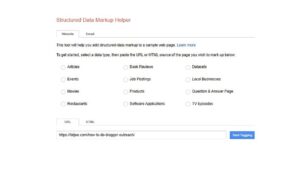
The tool will load the content.
Then, highlight specific parts of the page and choose the appropriate tag.

Once you’re done tagging, click the “Create HTML” button.
The tool will generate schema markup you can paste into your website’s HTML.
List Your Business
Online directory listings and local citations can help search engines see your business as a real thing or entity.
A Google Business Profile (GBP) is often more influential for local search than a standalone website.
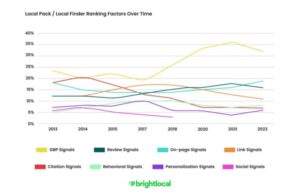
A GBP allows you to add details about your business straight into Google’s knowledge base.
You can tell Google what you sell, when you’re open, and where you’re located.
Google views each business location as a different entity. That’s why having distinct listings for every branch of your business is important.
Build Your Brand
The more people talk about you, the more likely search engines will see you as an important entity.
Customer reviews are key here.
Encourage feedback by making it easy for customers to leave reviews on your website, Google, and other platforms.
You can boost your brand footprint by being active on social media. Set up a consistent posting schedule and interact with followers.
This is also where press releases can be super-beneficial.
We LOVE Press Releases for SEO 📰
– Stack brand entity signals
– Build a solid foundation of natural links
– Act as great pillow links
– Exposure to a news story
– Some nice ‘as featured on’ accreditations.We’ve just revamped our Press Distribution Service, check it out 👇 pic.twitter.com/b8XDE9xrNL
— Joe Davies (@fatjoedavies) August 14, 2023
Press releases distribute news about your business to a wider audience and can enhance brand entity signals. They can make your brand more recognizable to search engines.
There’s also an opportunity to earn backlinks from high-authority news outlets and industry publications.
Get Backlinks From Trusted Sources
Backlinks are a key Google ranking factor. That doesn’t change with entity-based SEO.
Getting links from highly relevant, authoritative websites can reinforce the entities associated with your content.
The big thing here is relevance.
You want to target websites relevant to the entities (topics) that are important to your website.
When it comes to backlinks, prioritize quality over quantity.
If an unrelated company links to your site, it can have very little impact, regardless of its size or reputation.
The relevance of the endorsing site is far more important than domain authority.
Alignment is key.
— Matt Caramenico (@mcaramen) September 14, 2023
For example, if your website focuses on organic food products, a link from a trusted health and nutrition website will boost your entity signals much more than a link from a random blog.
Link building for entity SEO needs to be highly focused. It’s about making sure the links you build strengthen your connection with the entities you want to rank for.
So How Do Entities Matter For SEO Agencies?
Entities matter in that they show how Google and other search engines take a holistic approach to their ranking results.
Long gone is the time when search engines would only understand a single page; now, they are able to comprehend not only multiple pages and sites but also the relationship of the information across them.
What this means is you need to be able to develop a holistic SEO strategy for your clients that embraces not only multiple types of SEO – on-page, off-page, and technical – but also multiple channels to develop an overall picture of your client.
It means short-term keyword-stuffed pages are not the way to go, instead, you need to work to develop a comprehensive client with and for your clients.
Future-Proof Your Rankings With Entity SEO
Google uses entities to understand and rank your website.
You need an SEO strategy that goes beyond keywords.
An entity-based SEO strategy is about seeing the bigger picture and how your website is connected with concepts, products, people, and places.
Optimizing for entity search strengthens those connections.
When Google sees you as an important entity, you’ll be rewarded with higher rankings and more organic traffic.
Become a Pro at SEO
Join 65,000 others and learn the secrets to SEO success with our weekly blog posts.

